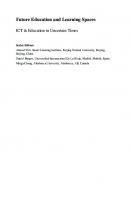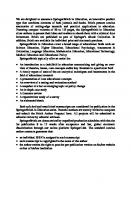Digital Education Revolution in Morocco Rapid Transformation and Future Trajectories
Digital Education Revolution in Morocco Rapid Transformation and Future Trajectories
141 86 297KB
English Pages [6]
Recommend Papers

- Author / Uploaded
- Dr. zeroual khalid
File loading please wait...
Citation preview
Digital Education Revolution in Morocco: Rapid Transformation and Future Trajectories Dr. zeroual khalid 26/11/2023
Université Mohammed V de Rabat Faculté des sciences The landscape of education in Morocco is undergoing propelled by a swift and purposeful transition towards digitalization. This abstract delves into the transformative journey of the Moroccan educational sphere, emphasizing the rapid strides taken in embracing digital methodologies. Focusing the dynamic initiatives and strategic thrusts, it navigates through the catalysts propelling this accelerated move. It explores the integration of technology into pedagogy, the emergence of e-learning platforms, and the cultivation of digital literacy. Moreover, this
abstract accentuates the collaborative efforts between governmental bodies, educational institutions, and technological pioneers, fostering an ecosystem primed for digital advancement. By capturing the essence of this accelerated movement, the abstract illuminates the newfound trajectories and potentials poised to redefine education in Morocco, shaping a future teeming with digital promise and educational innovation. Morocco's commitment to digital transformation is reflected in its National Digital Strategy, emphasizing the integration of technology across sectors, including education. Governmental policies prioritize modernizing education, advocating for digital literacy, and incorporating technology in pedagogy to enhance learning outcomes. Rapid advancements in technology have enabled Morocco to leapfrog traditional educational barriers, making digital tools more accessible and affordable. The emergence of userfriendly e-learning platforms and educational applications has provided opportunities for remote learning and skill development. Increased access to smartphones and affordable computing devices has facilitated connectivity and access to digital educational resources. Aligning educational curricula with global industry demands necessitates digital skills, prompting Morocco to prioritize digital literacy and technical competencies. A global trend towards continuous education and upskilling drives Morocco's focus on providing accessible digital learning pathways for professionals and learners. The confluence of governmental policies emphasizing digital integration, rapid technological advancements, and global shifts towards digital learning paradigms has catalyzed Morocco's accelerated move towards digital education. These factors collectively drive the urgency to modernize education,
enhance digital literacy, and equip learners with the skills necessary for success in the digital era. Moroccan Digital Schools Project (MDSP) e-Lycee and eCollège Programs Establishment of digital schools equipped with technology for enhanced learning experiences. Providing access to modern tech tools, improving digital literacy, and transforming traditional education. Implementing digital resources and platforms in high schools and colleges. Integration of technology into classrooms, offering digital content, and fostering interactive learning environments. Collaboration between tech giants and educational institutions for training and workshops. Training educators in tech integration, enhancing digital teaching skills, and introducing innovative educational tools. Collaborations between telecom companies and educational institutions. Providing discounted internet services or free connectivity to schools, addressing digital divide issues. Short-term intensive programs offering coding and tech courses. Equipping learners with practical digital skills, addressing industry demands. Offering Massive Open Online Courses (MOOCs) and e-learning platforms. Accessible digital education resources for diverse learners, facilitating continuous learning. Establishing hubs supporting tech innovation and entrepreneurship. Fostering creativity, providing mentorship, and encouraging digital innovation in education and beyond. Growth in startups focusing on educational technology. Developing innovative educational tools, platforms, and resources tailored to Moroccan learners. These initiatives and partnerships reflect a concerted effort in Morocco to leverage technology, foster collaborations, and innovate educational models to accelerate digital education. By embracing public-private partnerships,
government-led projects, and innovative approaches, Morocco aims to transform its educational landscape, preparing learners for a digitally-driven future. Disparities in internet availability and quality in rural areas. Insufficient construction hindering widespread access to highspeed internet. Rural areas often lack access to necessary technology and reliable internet connectivity. Economic constraints limit access to devices and internet services for marginalized communities. Government initiatives to expand broadband networks to underserved areas. Training initiatives aimed at enhancing digital literacy among students and communities. Partnerships between companies and educational institutions to provide discounted or free services. Support from tech companies offering resources, devices, or connectivity solutions for educational purposes. Leveraging mobile technology for educational content delivery, considering the prevalence of smartphones in Morocco. Developing content in local languages and dialects to increase accessibility and relevance. Policy adjustments to encourage and regulate online learning, ensuring its quality and accessibility. Encouraging innovative solutions and technologies in education through policy incentives. The swift adoption of digital education in Morocco faced significant infrastructure and access disparities. Mitigating these challenges involved a multi-pronged approach, including infrastructure development, access improvement initiatives, collaborative efforts, innovation in delivery methods, and necessary policy reforms. By addressing these hurdles, Morocco aims to create a more inclusive and accessible digital education landscape for its learners.
Sustainable and scalable digital education initiatives in Morocco rely on construction, adaptable pedagogical approaches, consistent resource allocation, supportive policy frameworks, and a focus on accessibility and innovation. By addressing these factors, digital education can not only meet but also evolve with the changing educational landscape, effectively catering to evolving needs and ensuring long-term viability and scalability. Develop a structured curriculum integrating digital literacy skills from early education to higher levels. Emphasize areas such as basic computer proficiency, coding, data literacy, cybersecurity, and digital communication. Offer hands-on workshops, hackathons, and project-based learning opportunities focused on digital skills development. Encourage participation in coding clubs, robotics competitions, or tech-focused extracurricular activities. Provide access to online courses and self-paced modules catering to diverse digital literacy needs and learning styles. Offer careeroriented pathways highlighting in-demand digital skills based on industry trends. Facilitate internships or apprenticeships with tech companies, allowing hands-on exposure to industry practices and digital tools. Offer CPD programs focusing on integrating digital tools into teaching methodologies. Provide training in utilizing educational technology, online learning platforms, and digital content creation. Encourage educators to share best practices and innovative methods for integrating digital literacy into their teaching. Foster collaborative learning environments where educators learn from each other's experiences.Offer certification courses or workshops specifically designed for educators to enhance their digital teaching skills. Include modules on adapting curriculum to incorporate digital literacy across
subjects. Provide access to resources such as teaching guides, online tools, and platforms that facilitate digital teaching. Offer technical support and mentoring to assist educators in navigating digital tools effectively. Cultivate a culture of continuous learning, emphasizing the need for ongoing skill development in a rapidly evolving digital landscape. Regularly update curricula and professional development programs based on industry feedback and emerging job market demands. By emphasizing digital literacy through tailored programs for learners and educators alike, Morocco can equip its workforce with the necessary skills aligned with future job market needs, ensuring their preparedness for a digitally-driven world. The digital education revolution in Morocco signifies a rapid transformation poised to shape the future of learning and workforce readiness. This swift shift towards digitalization has been propelled by concerted efforts in infrastructure development, policy reforms, innovative collaborations, and a commitment to fostering digital literacy. The rapid digital education revolution in Morocco heralds a promising future, poised to equip learners and educators with the necessary digital prowess for success in an increasingly technologycentric world. By nurturing sustainability, scalability, and innovation, Morocco paves the way for a dynamic educational landscape, ensuring its place at the forefront of digital educational transformation





![Data science and digital transformation in the fourth industrial revolution [1st ed. 2021]
9783030647698, 3030647692](https://ebin.pub/img/200x200/data-science-and-digital-transformation-in-the-fourth-industrial-revolution-1st-ed-2021-9783030647698-3030647692.jpg)



![Digital Transformation and New Challenges: Digitalization of Society, Economics, Management and Education [1st ed.]
9783030439927, 9783030439934](https://ebin.pub/img/200x200/digital-transformation-and-new-challenges-digitalization-of-society-economics-management-and-education-1st-ed-9783030439927-9783030439934.jpg)